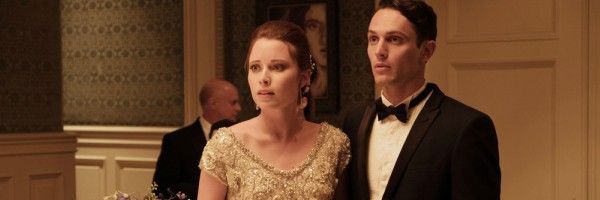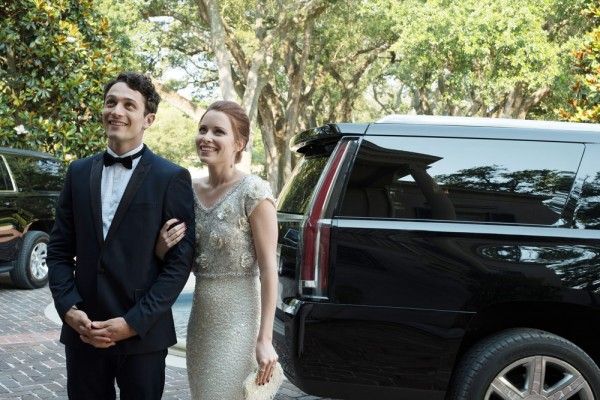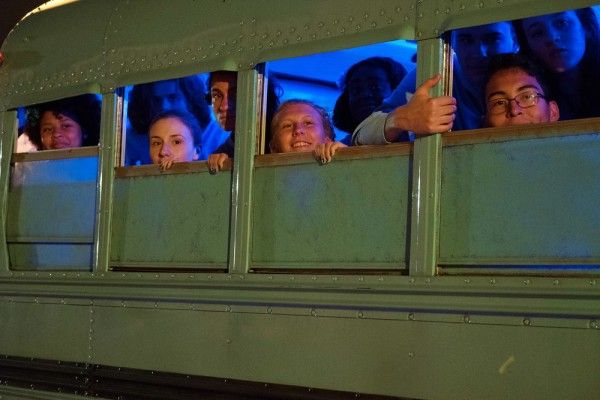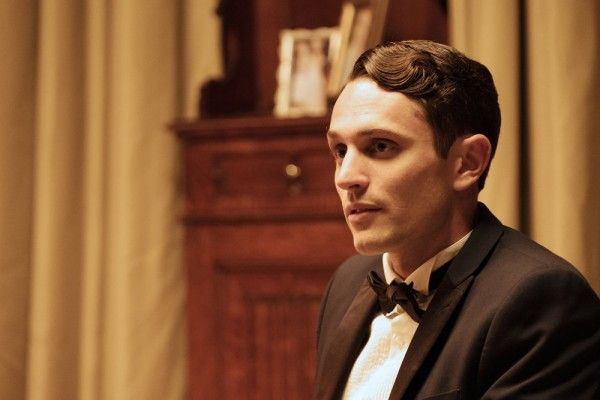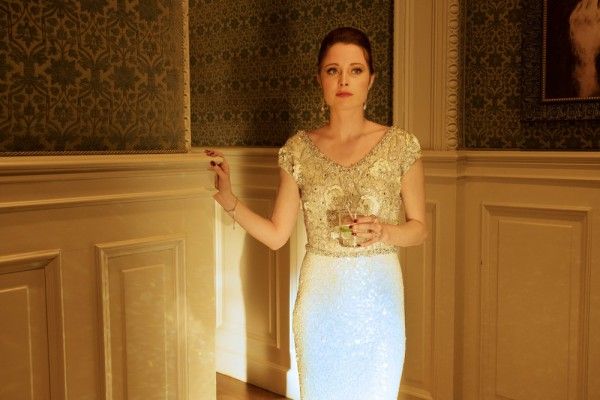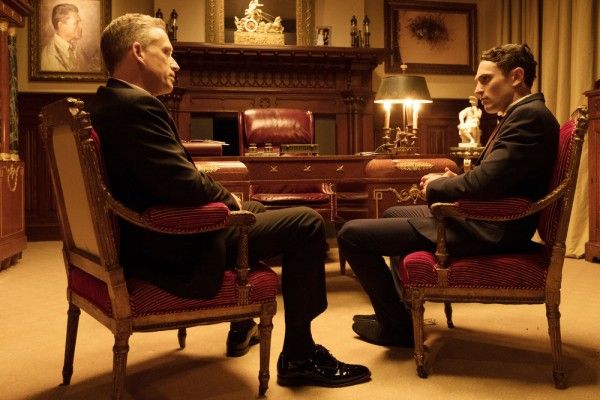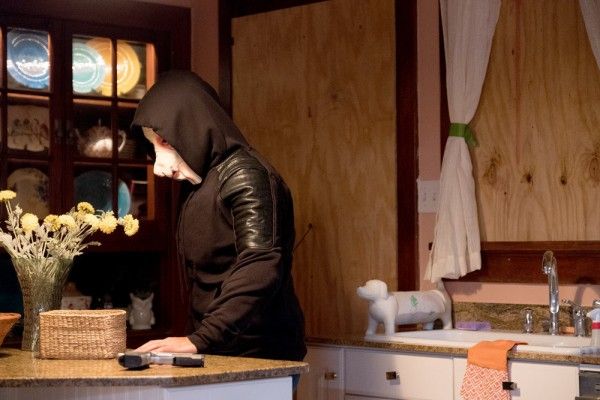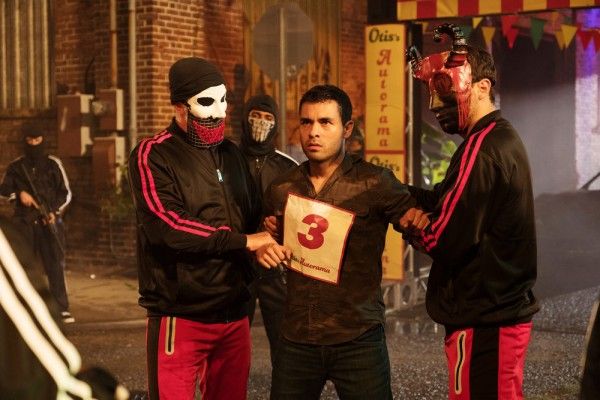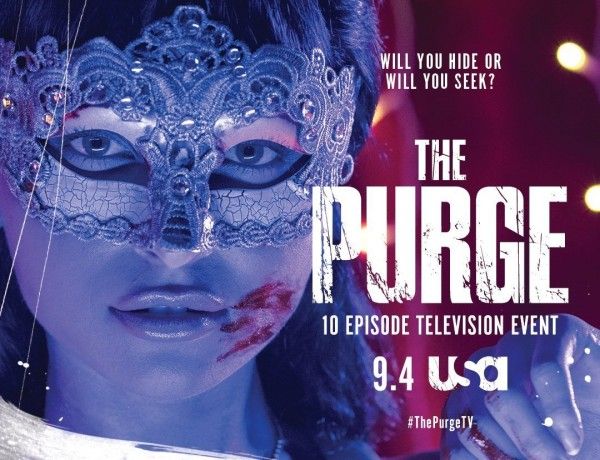After four feature films, The Purge is coming to TV with the new USA series from Blumhouse and creator James DeMonaco. Set ten years into the existence of the annual Purge, the series introduces a cast of new characters who set out to survive Purge night over the 10-episode run. As is tradition for the franchise, you're bound to run into people all across the moral spectrum, but two of the so-called "good guys" heading out this Purge night are Rick and Jenna Bettencourt (Colin Woodell and Hannah Anderson), an anti-Purge married couple who venture out during the annual murder holiday for the first time ever in the hopes of securing funds for their (mostly) philanthropic dreams.
Back in June, I had the opportunity to visit New Orleans, where filming on the Purge series was well underway. While there, I had the opportunity to visit the sets, observing and speak with the cast and crew, including Woodell and Anderson. The duo was a delight to talk to, with a snappy back-and-forth chemistry and a whole lot to say about the upcoming series, including details about their characters, how political the series will get compared to the film franchise, why the serialized format allows for more intimacy among the action, and how far the network is taking the on-screen violence. Check out what they had to say below, and for more on the Purge series check out my full set visit report.
Because we know so little about this show, give me a bit of the set up. Who are your characters and where do we pick up with them in the show?
HANNAH ANDERSON: We first find Rick and Jenna Bettencourt when they're getting ready to go out for the first time on Purge night. They own a real estate development firm, and their goal is to lock down a deal tonight at the Stanton party in order to secure funding. Quite a bit of funding.
WOODELL: Yes, a lot of funding.
ANDERSON: To make them more comfortable financially, but also to help low income families in the communities where they build. Jenna is, I think she's a very pure character. I guess she's naïve in some ways, but she's an idealist and she really wants to help people. I think that's her main motivator, what she's driven by. And she's embarking on this journey tonight that is absolutely terrifying, and she has to keep it together. So a lot of it for her is tension that exists right underneath the surface. She's actually doing a lot of acting on Purge night.
WOODELL: And they both are. 'Cause Rick, on the other had, is someone who grew up with very little, and not much family surrounding him to help him and give him a helping hand. So there are these intentions where they're different than Jenna's, because he sees this night as an opportunity to attain a lot of the things he's lived without his whole life.
A little less pure?
WOODELL: Yeah. And I think he has a definite moral compass, but I do think he's a little more realistic in terms of this being the first and maybe finite opportunity for both of them to move this thing forward that they're creating. And I think the more and more we've been talking about this today in particular, I'm realizing what money provides in this world that we're living in, and just how terrifying it is.
We filmed a scene when we're leaving our home in the first episode, and I remember that day in particular because it was this odd feeling of locking up a house, and then immediately feeling scared. Know what I mean? And I think to a certain extent, my vision as Rick is to protect us. And the best way I can imagine doing that is by having the funds necessary to do so.
When I think about characters in your age range in this world, I think of how I grew up and an age where I remember life before the internet and life after. In the same way, your characters would've had life before the Purge, and life after. How does it inform your characters that this cultural change happened at a developmental age?
WOODELL: That's a good question. That is such a good question.
ANDERSON: That is a good question. So it’s been 10 years [of the Purge] ...
WOODELL: Which means pretty much our entire twenties, for the most part. Rick and Jenna have also been together for pretty much the entire duration-
ANDERSON: Probably about that whole time.
WOODELL: So they've grown together through this thing. And then for the first time ever they are also stepping out into the world, for the first time.
ANDERSON: I think that's why it's so scary. Because maybe there's been an element of denial. And to step out into it, where you're completely unprotected, for the first time in 10 years.
WOODELL: But that's also -- I'm finding especially with the election that happened a couple of years ago, no one believed that certain things were going to happen, and that every single news article that we read was actually just going to brush over, that nothing was going to actually happen. And I think to a certain extent with the Purge holiday, Rick and Jenna both believe that something would subside, that it was temporary. And we're now realizing that there's no signs of this slowing down. And that, especially with the franchise that's already been established before us, this thing is a well-oiled machine. And there is no stopping it. So the best way to conduct yourself is to embrace it to a certain extent. Find a way to navigate within it.
Do they see it for what it is? A means of oppressing races and classes of people?
ANDERSON: I think so. I think that that is also a huge reason why we want to help people who don't have the funds to help themselves.
WOODELL: Which is an ironic position to be in. Because the man we're going to for the necessary funds is a person who does oppress the poor. But we want his money to help us do the opposite.
It's not far off from how things work in reality.
WOODELL: No. Not at all. Exactly, right?
ANDERSON: That's why it's scary.
Right. Do you guys, because I know a lot of actors are very focused on what's on the page, specifically. In the character work for this, do you at all internalize the political ramifications of this type of story?
ANDERSON: Yes. I mean, I'm very aware of some of the parallels between what happens in the Purge and what's happening in real time America. And we are dealing with similar themes in The Purge. Ultimately it is supposed to be just a thrilling, entertaining ride. You don't want to be thinking too much about politics when you're watching the show, but that is gonna come up. Doesn't matter what your politics are, I think everyone will be able to relate to the Purge in some way.
WOODELL: And I think they've, the creators and the writers of the show and on the film, have been very particular about not making anything seem like it's a stance on one thing or another. It's all entertainment based. And whatever conversations you have as an audience with your friends or with whoever, whether it's online or in person, it's kind of up to you.
I do think the fourth Purge, with is gonna come out July 4, is by far and away from what I've seen of the posters and the trailers, by far the most, you know, it's commenting the most on present day America. But I also haven't seen the film, so I don't know to what extent. But I do know Tom Kelly, our show runner, is not pushing us in any particular direction. He's actually doing quite the opposite and letting us sort of ...
ANDERSON: Yeah, I think it's more personal than political.
Well you mentioned the posters for the fourth Purge, and that "Make America Purge Again"… that's a big swing.
WOODELL: Huge statement.
Yeah.
WOODELL: And I know some people loved that. I live in Los Angeles and people were like "Did you see that poster?" And it was a huge response. We're on USA network, and I think this is a network that is very very broad, and people from all over the country watch this, and that means those people have all different types of political views.
ANDERSON: We're not trying to isolate anyone. We appeal to such a wide audience.
WOODELL: Which is a very difficult task, and it's gonna be really exciting and interesting to see.
ANDERSON: Well, I mean, like reality, there aren't easy answers. It's not like only one type of person thinks about these things.
WOODELL: Yes, exactly.
For you guys in developing and playing the relationship between your characters as they go through the arc of this night — I’m imagining they’re going to come into some conflict over it.
WOODELL: [Laughs] Why would you think that?
ANDERSON: No, it's pretty easy breezy.
What is the reference point for that marriage to survive something like this? What is the rock that may or may not keep them together through this ordeal, essentially?
WOODELL: Well, you're pregnant. And I would say that is the biggest thing.
ANDERSON: Yeah, we're a family now, so we're thinking about it in a different way. We're protecting a family, is a very different thing than just having the two of you. But I think when people are forced into survival mode, there are sides of them that come out that they didn't even know were there. And so they're each seeing sides of themselves that they haven't seen before, and that's causing a lot of tension.
WOODELL: Yes.
ANDERSON: On a night when they have to come together.
But this is a couple who does love each other, right?
ANDERSON: Oh, yeah. And they've been together for so long.
WOODELL: But they also, and you see this right away in the first episode, there is sort of this lack of passion between the two of them. And I think it's the world around them that's kind of weighed them down, to a certain extent. And neither of them have been able to fully see eye-to-eye on many different things. So the passion is reawakened on this evening in not necessarily the best way, but it's definitely ...
ANDERSON: Passion reawakened. I'm stealing that.
Are you guys fans of the Purge franchise, and if you weren't, did you feel inclined to visit it before you took on this role?
WOODELL: I definitely had not seen the films before. Was very very well aware of them, which I think is different from Hannah's answer.
ANDERSON: We'll get to that. [Laughs]
WOODELL: But no, I also have within the last couple of years finally forced myself to become a horror thriller fan. But I really kind of steer clear of them because I'm an easy jumper when it comes to jump scares, and I just assume the Purge is gonna have a lot of those. But once I got the part, I needed to. I actually, interestingly enough, did it the opposite way. I watched the third movie then the second movie then the first movie. So I did it out of order. But that's also the beauty of this franchise. You don't need context. As long as you know it's a holiday and it's celebrated. It was actually really interesting doing it that way because it became more intimate as I progressed and watched the first film. But I would definitely say it was crucial. It wasn't crucial in getting the role, but it was definitely a necessity once we started.
ANDERSON: I may have a unique perspective. I was living under a rock, and I had not heard of The Purge, I did not know it existed. Because horror films, I can't. So I was reading through the pilot, and I was like what is the “Purge” that everyone's talking about? What is this?
WOODELL: That is so funny.
ANDERSON: And then I got to the end and I realized what it was and it just hit me like a ton of bricks. I think it really made it land for me.
WOODELL: Did you go and do a bunch of research into the films after?
ANDERSON: No, then I still didn't know that there were films. That there were Purge films. I was like that's fascinating-
WOODELL: [Laughs] How did you not [know]!?
ANDERSON: Hold on. I was like, this is a fascinating premise, this is brilliant. It's terrifying. It's perfect. And then a friend of mine was like "Have you seen the films?" And I was like "Excuse me?" And then we watched the first film together.
WOODELL: How big was this rock you were living under?
ANDERSON: It was giant.
WOODELL: It might have something to do with her being from Canada.
ANDERSON: I'm Canadian, can I play that card?
WOODELL: We can use that as an excuse, for sure.
Things aren't quite as intense there, right?
ANDERSON: My friends don't watch horror films. They're like "Can you please do something we can watch?"
WOODELL: See, mine love it.
So then being that neither of you are big horror fans, what was your experience finally watching the films?
WOODELL: The first one creeped me out probably the most because of the intimacy. And Ethan Hawke is just… that guy is something. But I will say the second one in particular was the most fun for me to watch. Because I lived in Los Angeles it was also very bizarre. It was a bizarre feeling watching it. But I felt safer with Frank Grillo leading the charge in a weird way. And it's weird how we take solace in our leads, in our characters in particular. But with him, he was just this man with a drive that we didn't know what it was, but we felt safe with him. Whenever he was onscreen, and I think what's so cool about the show in contrast, we have a lot of different walks of life here. And you're gonna feel very safe with particular people, but then you're gonna really want to be that fly on the wall eavesdropping on another storyline. So that's a cool experience for me.
ANDERSON: I cried for both the first time I saw.
WOODELL: You cried?
ANDERSON: I had to take breaks. I was watching it with my friend, the first one. And I also sometimes when I get scared or whatever, any big emotion comes up, I just start laughing. 'Cause I was just like, this isn't really happening to this family, and I got really invested.
WOODELL: You cried?
ANDERSON: When Ethan Hawke dies, I cried. I was really upset about it. And then in the second movie, some other, oh the husband-
WOODELL: When he gets shot, yeah.
ANDERSON: And then I just really empathized with these characters going through this.
WOODELL: That's good. And that's why she plays Jenna.
ANDERSON: I have a lot of empathy.
WOODELL: Yeah, exactly.
So on that scale you talked about, where do you feel like the show falls? From intimate to sort of grand?
ANDERSON: Wow. Well I think the amazing thing about the TV show is we get to follow each character on the entirety of their journey throughout the Purge. So we get to see their entire experience of Purge night, instead of just little snippets here and there.
WOODELL: But it is intimate. Because of that. I think that has been the one thing about the films that frustrated me is that I only had the capacity to root for one or two people in those films, because the rest were just kind of filler. And that's no discredit to any of the actors or any of the direction, it's just, it was more about the action.
ANDERSON: It was like “Go, go, go,” whereas we have some time to get into the deeper inner lives of the character-
WOODELL: The rhythm.
ANDERSON: In each level.
The show is on USA, so in terms of the actual violent content, in your experience from what you’ve shot so far, how far are they taking it?
ANDERSON: They're taking it pretty far. Our storyline we haven't quite gotten there yet, but what I've seen, it's really intense. But it's also stylized, and they're making it look.. it's weirdly beautiful images. The violence.
WOODELL: Which the film did capture as well. The art form of violence. It is not HBO and we are not going graphically overboard with anything, but everything is implied and it's pretty clear what's happening. But there are limitations, and I'm actually glad we are not glorifying violence for the sake of the time period and also it being a cable show. But I do think the scare factor is very very very palpable.
ANDERSON: Oh yeah. I mean, it's The Purge, so people die.
You talked about the range of locations in the films, which take us from downtown L.A. to suburbia. Does it affect the style of this show that it’s meant to feel like Everytown, USA?
WOODELL: I think so, just because you are going to see all walks of life. Our storyline in particular shows the elitists. Then you get to see Miguel navigate this terrifying underbelly of this city which we don't know.
ANDERSON: Yeah, you got your opposites and everything in between. It's partly why we appeal to such a wide audience.
It's interesting too, because we spoke with Tom Kelly briefly, and he mentioned that hey put a priority on not just exploring class stories, but having class diversity within the writers room.
WOODELL: That's pretty cool. We haven't gotten the chance to really meet with any of the writers.
ANDERSON: I've only met two of them.
WOODELL: Yeah. But that's okay. I mean honestly, it wouldn't change anything for us. The words are on the paper, and that's what matters. But that is really cool to hear. It makes me really happy. I think Tom is also a guy who's in politics and he knows how to say something without fully saying something. Or giving too much away. And he's definitely been that way with us, with our storylines. Without revealing too much so we can round those corners.
ANDERSON: Oh yeah, we're really gonna give a secret. We can't get anything out of them. We're like, what's gonna happen? They're like, maybe you die, maybe you don't.
So you don't know where you end up?
ANDERSON: No, we have no idea.
Oh no.
WOODELL: [Laughs] We were hoping you would know!
ANDERSON: I only know we've only got an episode up to episode 5.
WOODELL: Yeah.
As performers and actors, does that drive you crazy or do you like the experience from it?
ANDERSON: This is my first time experiencing this, and I thought it would drive me crazier. Sometimes it does. But I kinda like getting to know my character more each episode. And it also makes me feel like I'm part of the audience, because I'm held in suspense. I think that's how the audience would feel if they were watching it.
WOODELL: Totally. I think for me, in film for sure, you get that experience. It's like a play. You get to really hash out every single bit and piece of it, but with this, I was initially frustrated because A, I wanted to know am I gonna live, and B, what is my backstory, why am I doing this, why am I saying this? But the reason that we haven't been able to learn these things about us is purely just trusting them, that they will answer it for us. And they have been consistently.
That's what I was gonna say. It's such a leap of faith to be like, they won't reveal something about you in episode 9 that undermines your performance in episode 2.
WOODELL: Completely. And we know they're watching. They're always watching.
ANDERSON: They're always watching.
WOODELL: And then there's so many parties involved with this too. There's Blumhouse, and there's USA. There's SyFy, there's so many, UCP, there's just a lot of cooks in the kitchen. And we know that whatever we're doing is sent right to them, and they're weighing in on it. So, it is trust. But it's also trust for our characters that this is all gonna go okay. And fingers are crossed, but we have no idea.

